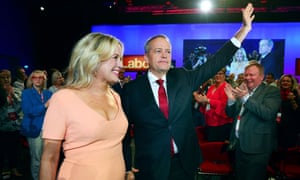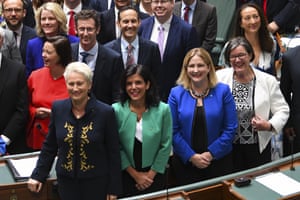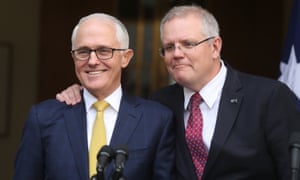Australia has not succumbed to the populism shaking other western
democracies. But the major parties know they are on borrowed time
In
international terms, Australia is a beacon, a country with a thriving
economy and a political system that has not yet turned entirely on
itself and succumbed to the populist forces roiling democracies
elsewhere. Still, 2018 was a brutal year in national affairs.
After a long siege, the Liberal party in late August felled another prime minister, Malcolm Turnbull, and installed its third leader in only two terms in office. Turnbull, a pragmatic centrist in a fractiously ideological centre-right party, was reasonably popular with the public but barely tolerated by his conservative colleagues, who undermined his position despite winning many practical concessions throughout his prime ministership.
The defenestration was a panicked response to poor results for the ruling Coalition in byelection contests, and it has damaged the government’s political standing. But Turnbull’s replacement, Scott Morrison, has spent the opening months of his prime ministership in overdrive, trying to build a legacy to campaign on when voters go the polls in the first half of 2019.
Morrison’s frenetic tempo shows no signs of abating. His objective is
to hold an election in May, after first delivering an economic
statement projecting a return to surplus, which would be the first
positive bottom line delivered by an Australian government since the
global financial crisis.After a long siege, the Liberal party in late August felled another prime minister, Malcolm Turnbull, and installed its third leader in only two terms in office. Turnbull, a pragmatic centrist in a fractiously ideological centre-right party, was reasonably popular with the public but barely tolerated by his conservative colleagues, who undermined his position despite winning many practical concessions throughout his prime ministership.
The defenestration was a panicked response to poor results for the ruling Coalition in byelection contests, and it has damaged the government’s political standing. But Turnbull’s replacement, Scott Morrison, has spent the opening months of his prime ministership in overdrive, trying to build a legacy to campaign on when voters go the polls in the first half of 2019.
While Morrison insists he will run the full term, a rocky parliamentary performance in the final session of 2018 has fuelled speculation the poll could be called earlier, given the Coalition now governs in minority in both chambers.
If parliament returns in February as scheduled, Morrison appears likely to face a de facto gesture of no confidence. Non-government parties are threatening to vote for legislation that would remove refugees from Nauru and Manus Island. If the threat is carried through, the Morrison government will lose a substantive vote – something that has not happened for almost 90 years.
With the parliamentary terrain now fraught, Morrison has curtailed the number of sitting days scheduled in the first half of 2019 to minimise the potential for embarrassment.
Public opinion polls suggest an electoral rout looms for the Coalition. The trend has been stubbornly negative. The government has not won a poll since the 2015 election.

With the electoral battles of 2019 in mind, the Coalition is trying to draw the national conversation on to more favourable territory for the government, amplifying differences on border protection and national security, and on economic management, in an effort to court undecided voters, particularly in Queensland, a conservative-leaning state that often determines the outcome of electoral contests because it has a high number of marginal seats.
Thus far, that political strategy has yielded no measurable political gains for Morrison and the Coalition, and government MPs are privately pessimistic about their chances of holding government in 2019. As parliamentarians take their summer holidays, some are fearing a generational rout.
"The major parties have undermined their own stability premium, which has helped fuel the rise of insurgents"
But the political story in 2019 is more complex and dynamic than a traditional major party contest that will play out in the first six months of the year.
Australia’s often bitterly contested public square is afflicted by the same diminution in trust in establishment politicians and in institutions that is evidenced in other western democracies. Recent research from the Museum of Australian Democracy shows satisfaction with democracy has more than halved over the past decade.
A number of polls and studies suggest Australian voters are less inclined to exhibit partisan loyalties. Voters are showing interest in political disruptors – mainly non-aligned independents now contesting elections, both state and federal, in growing numbers, and with increasing professionalism.
For Australian politicians, voter disaffection has become the opponent.
While election cycles can be polarising, particularly at times when there is a national mood to change the government, one of the more fascinating stories of 2019 will be the extent to which political independents continue to disrupt the status quo, and the implications of that for the character of the parliaments that are eventually formed.
When Labor’s Julia Gillard formed government in 2010, she presided over the first minority parliament since the second world war. A hung parliament was seen as an aberration in the federal context, although they are not uncommon at the state level.

It’s a vicious cycle. Once the ramparts of the Australian political system, the major parties have undermined their own stability, which has helped fuel the rise of insurgents.
The major parties, whatever the eventual result of the 2019, understand that the projection of dysfunction and disunity to the voting public is corrosive to their standing. Both of the major parties have changed their rules to make it more difficult to topple serving leaders.
But if the Coalition goes on to endure a massive defeat in 2019, the post-election reckoning could radically reshape the political landscape.
Underpinning the internal arguments of this period in government has been profound philosophical differences between the liberal and conservative wings of the ruling Coalition, and some fear opposition, if that’s the destination, will create febrile conditions to settle scores.

No comments:
Post a Comment